LAWS20062: Analysis and Critique of WTO Dispute Resolution
VerifiedAdded on 2022/10/09
|13
|3020
|18
Report
AI Summary
This report provides a comprehensive analysis of the World Trade Organization's (WTO) dispute resolution system. It begins with an introduction to the WTO's role in international trade and its mechanisms for resolving disputes between member nations. The report then details the various stages of the dispute resolution process, including consultation, panel establishment, the appellate body, and the adoption of reports. It explains the roles of key bodies such as the Dispute Settlement Body (DSB), the Director-General, and the Appellate Body. The report highlights the importance of the dispute resolution system in enforcing trade rules and maintaining a multilateral trading system. Furthermore, the report critiques the WTO's dispute resolution system by identifying issues such as delays in the process, the impact of non-compliance, and other inefficiencies. The report concludes by summarizing the key findings and evaluating the overall effectiveness of the WTO's dispute resolution system.
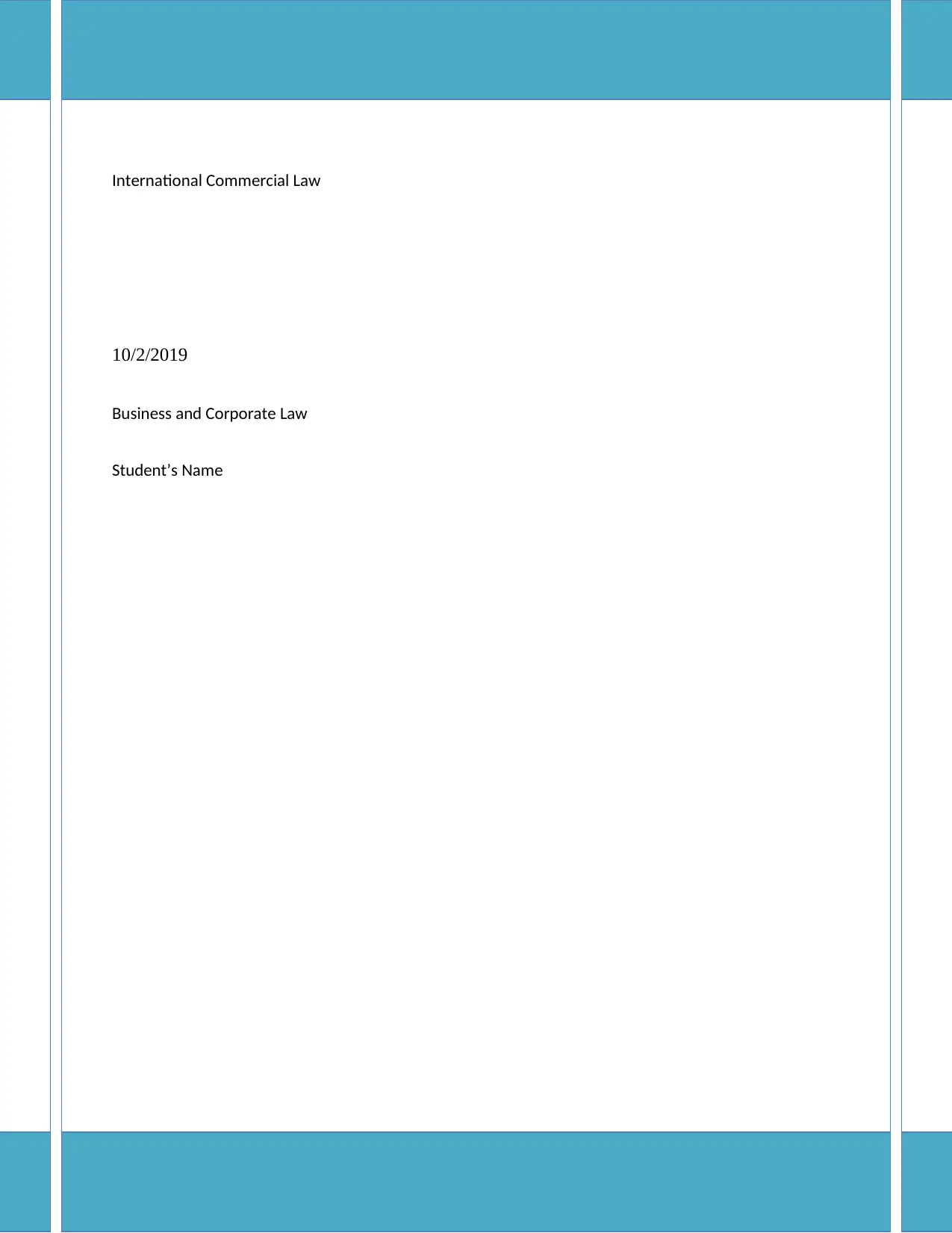
Running Head: BUSINESS AND CORPORATION LAW 0
International Commercial Law
10/2/2019
Business and Corporate Law
Student’s Name
International Commercial Law
10/2/2019
Business and Corporate Law
Student’s Name
Paraphrase This Document
Need a fresh take? Get an instant paraphrase of this document with our AI Paraphraser
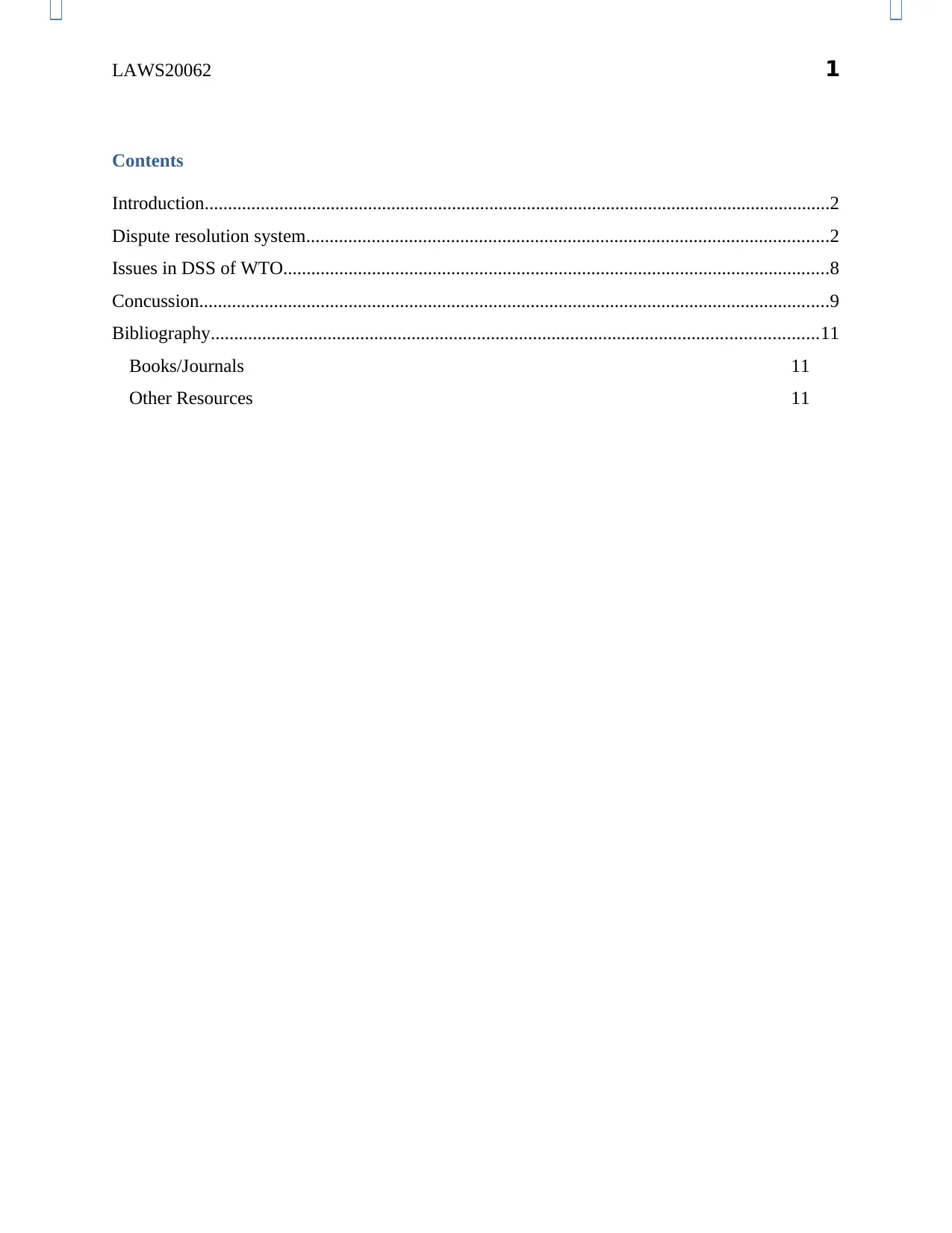
LAWS20062 1
Contents
Introduction......................................................................................................................................2
Dispute resolution system................................................................................................................2
Issues in DSS of WTO.....................................................................................................................8
Concussion.......................................................................................................................................9
Bibliography..................................................................................................................................11
Books/Journals 11
Other Resources 11
Contents
Introduction......................................................................................................................................2
Dispute resolution system................................................................................................................2
Issues in DSS of WTO.....................................................................................................................8
Concussion.......................................................................................................................................9
Bibliography..................................................................................................................................11
Books/Journals 11
Other Resources 11
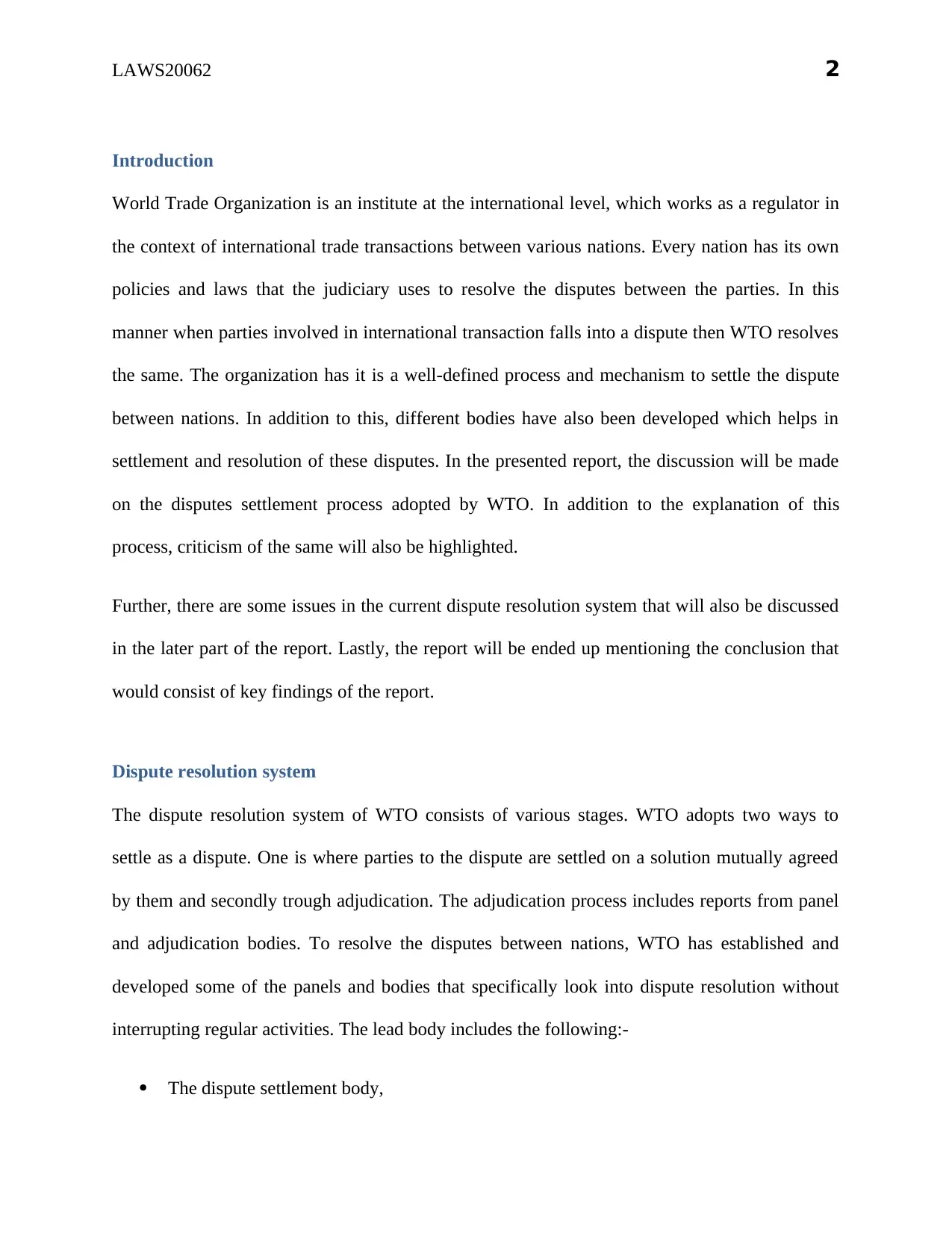
LAWS20062 2
Introduction
World Trade Organization is an institute at the international level, which works as a regulator in
the context of international trade transactions between various nations. Every nation has its own
policies and laws that the judiciary uses to resolve the disputes between the parties. In this
manner when parties involved in international transaction falls into a dispute then WTO resolves
the same. The organization has it is a well-defined process and mechanism to settle the dispute
between nations. In addition to this, different bodies have also been developed which helps in
settlement and resolution of these disputes. In the presented report, the discussion will be made
on the disputes settlement process adopted by WTO. In addition to the explanation of this
process, criticism of the same will also be highlighted.
Further, there are some issues in the current dispute resolution system that will also be discussed
in the later part of the report. Lastly, the report will be ended up mentioning the conclusion that
would consist of key findings of the report.
Dispute resolution system
The dispute resolution system of WTO consists of various stages. WTO adopts two ways to
settle as a dispute. One is where parties to the dispute are settled on a solution mutually agreed
by them and secondly trough adjudication. The adjudication process includes reports from panel
and adjudication bodies. To resolve the disputes between nations, WTO has established and
developed some of the panels and bodies that specifically look into dispute resolution without
interrupting regular activities. The lead body includes the following:-
The dispute settlement body,
Introduction
World Trade Organization is an institute at the international level, which works as a regulator in
the context of international trade transactions between various nations. Every nation has its own
policies and laws that the judiciary uses to resolve the disputes between the parties. In this
manner when parties involved in international transaction falls into a dispute then WTO resolves
the same. The organization has it is a well-defined process and mechanism to settle the dispute
between nations. In addition to this, different bodies have also been developed which helps in
settlement and resolution of these disputes. In the presented report, the discussion will be made
on the disputes settlement process adopted by WTO. In addition to the explanation of this
process, criticism of the same will also be highlighted.
Further, there are some issues in the current dispute resolution system that will also be discussed
in the later part of the report. Lastly, the report will be ended up mentioning the conclusion that
would consist of key findings of the report.
Dispute resolution system
The dispute resolution system of WTO consists of various stages. WTO adopts two ways to
settle as a dispute. One is where parties to the dispute are settled on a solution mutually agreed
by them and secondly trough adjudication. The adjudication process includes reports from panel
and adjudication bodies. To resolve the disputes between nations, WTO has established and
developed some of the panels and bodies that specifically look into dispute resolution without
interrupting regular activities. The lead body includes the following:-
The dispute settlement body,
⊘ This is a preview!⊘
Do you want full access?
Subscribe today to unlock all pages.

Trusted by 1+ million students worldwide
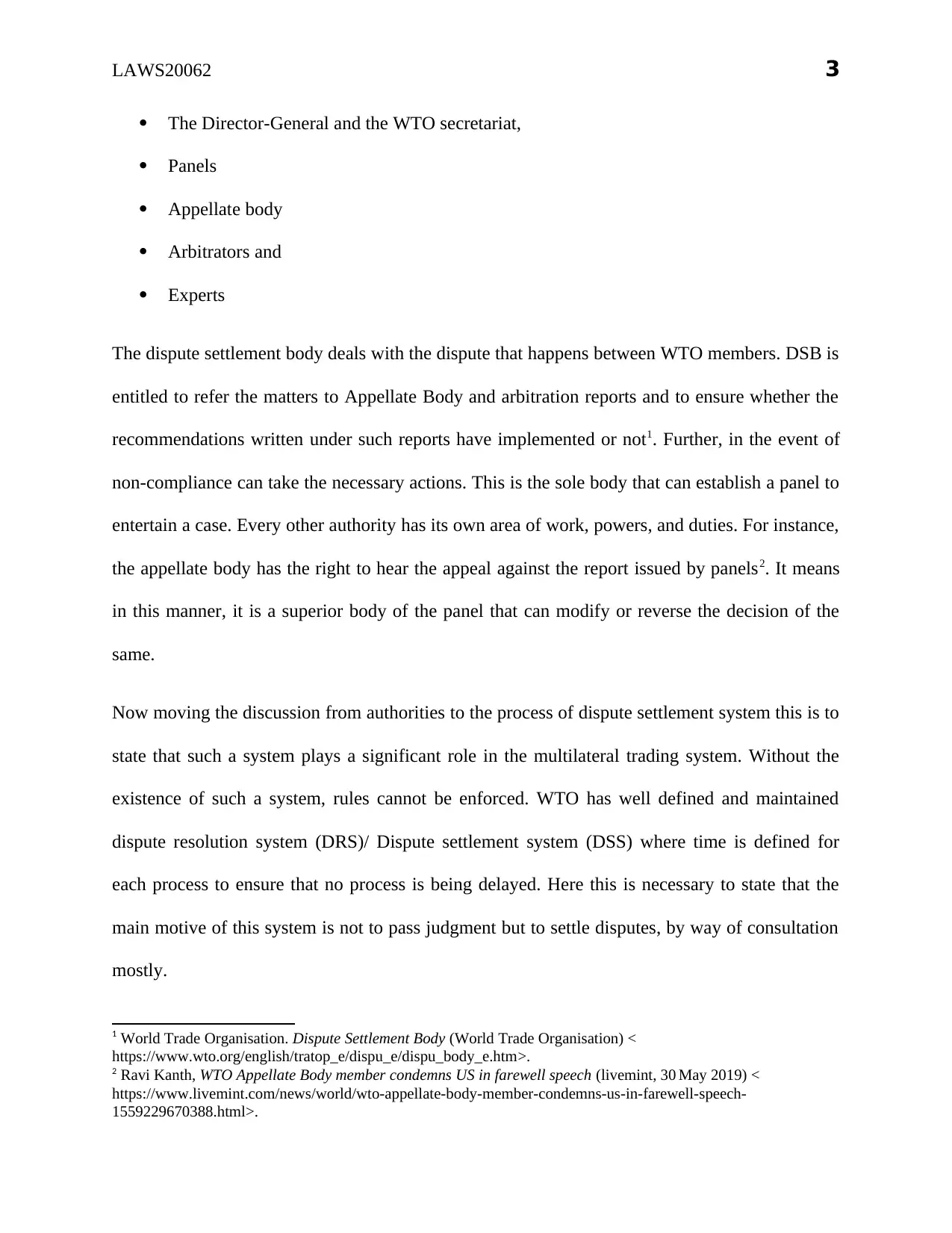
LAWS20062 3
The Director-General and the WTO secretariat,
Panels
Appellate body
Arbitrators and
Experts
The dispute settlement body deals with the dispute that happens between WTO members. DSB is
entitled to refer the matters to Appellate Body and arbitration reports and to ensure whether the
recommendations written under such reports have implemented or not1. Further, in the event of
non-compliance can take the necessary actions. This is the sole body that can establish a panel to
entertain a case. Every other authority has its own area of work, powers, and duties. For instance,
the appellate body has the right to hear the appeal against the report issued by panels2. It means
in this manner, it is a superior body of the panel that can modify or reverse the decision of the
same.
Now moving the discussion from authorities to the process of dispute settlement system this is to
state that such a system plays a significant role in the multilateral trading system. Without the
existence of such a system, rules cannot be enforced. WTO has well defined and maintained
dispute resolution system (DRS)/ Dispute settlement system (DSS) where time is defined for
each process to ensure that no process is being delayed. Here this is necessary to state that the
main motive of this system is not to pass judgment but to settle disputes, by way of consultation
mostly.
1 World Trade Organisation. Dispute Settlement Body (World Trade Organisation) <
https://www.wto.org/english/tratop_e/dispu_e/dispu_body_e.htm>.
2 Ravi Kanth, WTO Appellate Body member condemns US in farewell speech (livemint, 30 May 2019) <
https://www.livemint.com/news/world/wto-appellate-body-member-condemns-us-in-farewell-speech-
1559229670388.html>.
The Director-General and the WTO secretariat,
Panels
Appellate body
Arbitrators and
Experts
The dispute settlement body deals with the dispute that happens between WTO members. DSB is
entitled to refer the matters to Appellate Body and arbitration reports and to ensure whether the
recommendations written under such reports have implemented or not1. Further, in the event of
non-compliance can take the necessary actions. This is the sole body that can establish a panel to
entertain a case. Every other authority has its own area of work, powers, and duties. For instance,
the appellate body has the right to hear the appeal against the report issued by panels2. It means
in this manner, it is a superior body of the panel that can modify or reverse the decision of the
same.
Now moving the discussion from authorities to the process of dispute settlement system this is to
state that such a system plays a significant role in the multilateral trading system. Without the
existence of such a system, rules cannot be enforced. WTO has well defined and maintained
dispute resolution system (DRS)/ Dispute settlement system (DSS) where time is defined for
each process to ensure that no process is being delayed. Here this is necessary to state that the
main motive of this system is not to pass judgment but to settle disputes, by way of consultation
mostly.
1 World Trade Organisation. Dispute Settlement Body (World Trade Organisation) <
https://www.wto.org/english/tratop_e/dispu_e/dispu_body_e.htm>.
2 Ravi Kanth, WTO Appellate Body member condemns US in farewell speech (livemint, 30 May 2019) <
https://www.livemint.com/news/world/wto-appellate-body-member-condemns-us-in-farewell-speech-
1559229670388.html>.
Paraphrase This Document
Need a fresh take? Get an instant paraphrase of this document with our AI Paraphraser
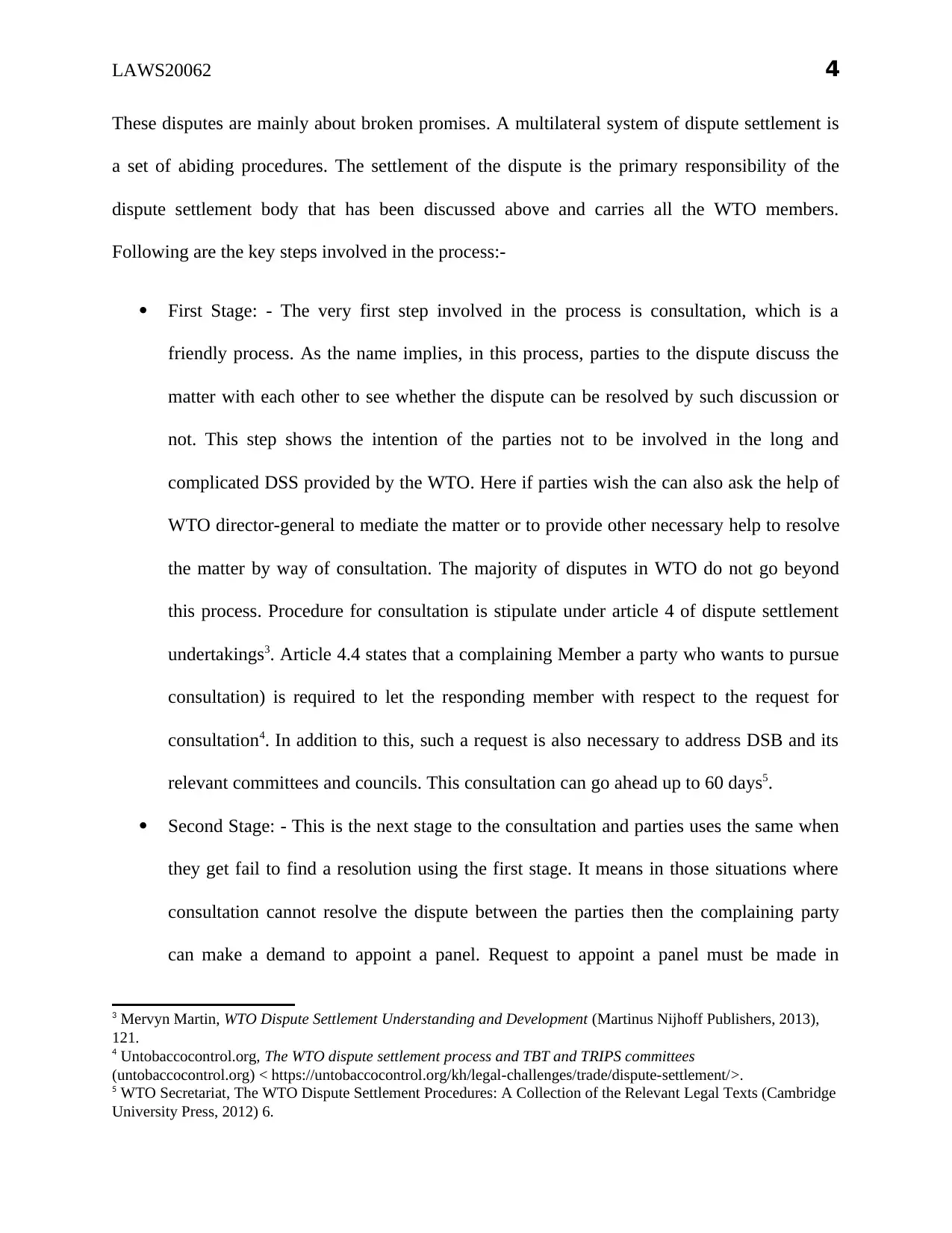
LAWS20062 4
These disputes are mainly about broken promises. A multilateral system of dispute settlement is
a set of abiding procedures. The settlement of the dispute is the primary responsibility of the
dispute settlement body that has been discussed above and carries all the WTO members.
Following are the key steps involved in the process:-
First Stage: - The very first step involved in the process is consultation, which is a
friendly process. As the name implies, in this process, parties to the dispute discuss the
matter with each other to see whether the dispute can be resolved by such discussion or
not. This step shows the intention of the parties not to be involved in the long and
complicated DSS provided by the WTO. Here if parties wish the can also ask the help of
WTO director-general to mediate the matter or to provide other necessary help to resolve
the matter by way of consultation. The majority of disputes in WTO do not go beyond
this process. Procedure for consultation is stipulate under article 4 of dispute settlement
undertakings3. Article 4.4 states that a complaining Member a party who wants to pursue
consultation) is required to let the responding member with respect to the request for
consultation4. In addition to this, such a request is also necessary to address DSB and its
relevant committees and councils. This consultation can go ahead up to 60 days5.
Second Stage: - This is the next stage to the consultation and parties uses the same when
they get fail to find a resolution using the first stage. It means in those situations where
consultation cannot resolve the dispute between the parties then the complaining party
can make a demand to appoint a panel. Request to appoint a panel must be made in
3 Mervyn Martin, WTO Dispute Settlement Understanding and Development (Martinus Nijhoff Publishers, 2013),
121.
4 Untobaccocontrol.org, The WTO dispute settlement process and TBT and TRIPS committees
(untobaccocontrol.org) < https://untobaccocontrol.org/kh/legal-challenges/trade/dispute-settlement/>.
5 WTO Secretariat, The WTO Dispute Settlement Procedures: A Collection of the Relevant Legal Texts (Cambridge
University Press, 2012) 6.
These disputes are mainly about broken promises. A multilateral system of dispute settlement is
a set of abiding procedures. The settlement of the dispute is the primary responsibility of the
dispute settlement body that has been discussed above and carries all the WTO members.
Following are the key steps involved in the process:-
First Stage: - The very first step involved in the process is consultation, which is a
friendly process. As the name implies, in this process, parties to the dispute discuss the
matter with each other to see whether the dispute can be resolved by such discussion or
not. This step shows the intention of the parties not to be involved in the long and
complicated DSS provided by the WTO. Here if parties wish the can also ask the help of
WTO director-general to mediate the matter or to provide other necessary help to resolve
the matter by way of consultation. The majority of disputes in WTO do not go beyond
this process. Procedure for consultation is stipulate under article 4 of dispute settlement
undertakings3. Article 4.4 states that a complaining Member a party who wants to pursue
consultation) is required to let the responding member with respect to the request for
consultation4. In addition to this, such a request is also necessary to address DSB and its
relevant committees and councils. This consultation can go ahead up to 60 days5.
Second Stage: - This is the next stage to the consultation and parties uses the same when
they get fail to find a resolution using the first stage. It means in those situations where
consultation cannot resolve the dispute between the parties then the complaining party
can make a demand to appoint a panel. Request to appoint a panel must be made in
3 Mervyn Martin, WTO Dispute Settlement Understanding and Development (Martinus Nijhoff Publishers, 2013),
121.
4 Untobaccocontrol.org, The WTO dispute settlement process and TBT and TRIPS committees
(untobaccocontrol.org) < https://untobaccocontrol.org/kh/legal-challenges/trade/dispute-settlement/>.
5 WTO Secretariat, The WTO Dispute Settlement Procedures: A Collection of the Relevant Legal Texts (Cambridge
University Press, 2012) 6.
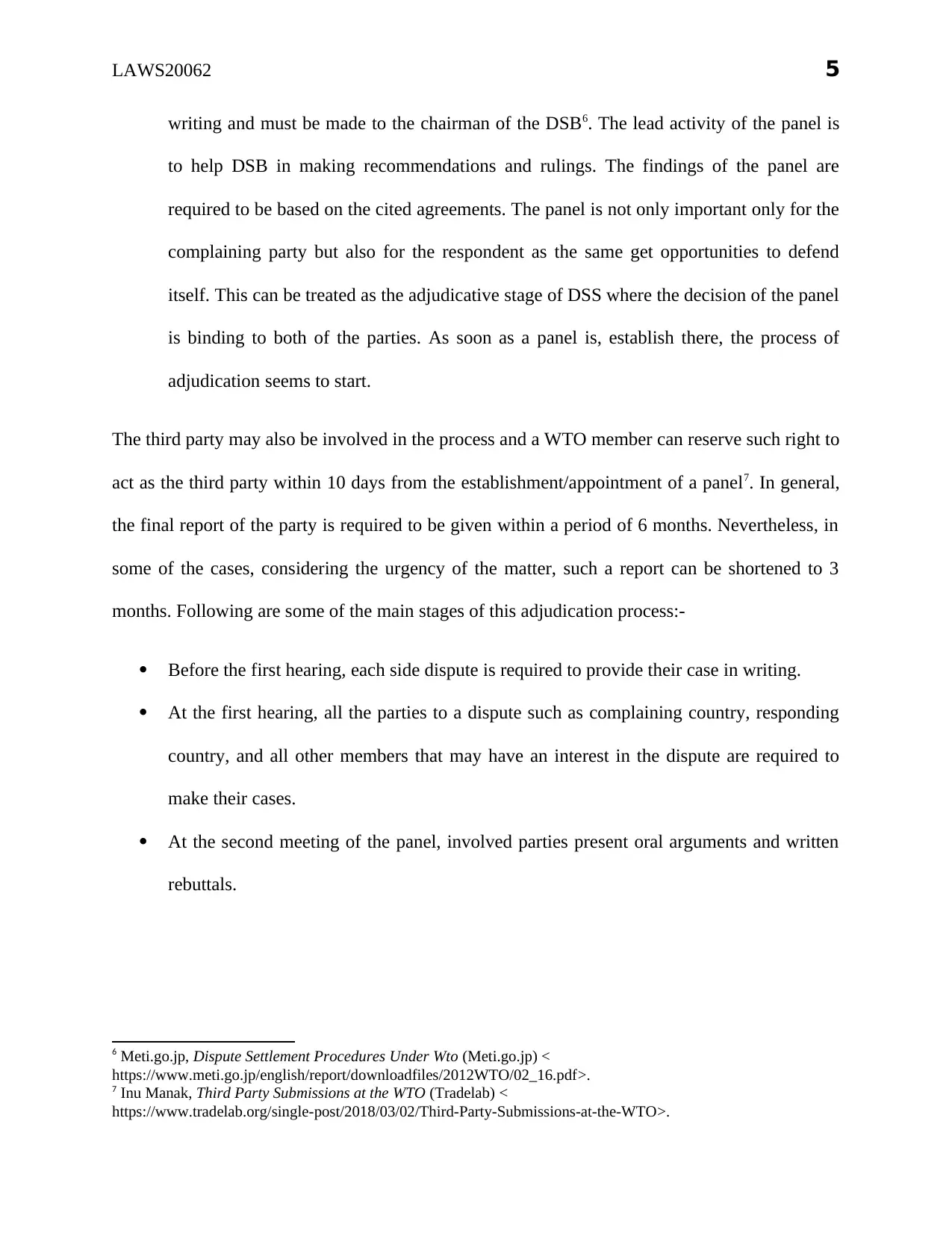
LAWS20062 5
writing and must be made to the chairman of the DSB6. The lead activity of the panel is
to help DSB in making recommendations and rulings. The findings of the panel are
required to be based on the cited agreements. The panel is not only important only for the
complaining party but also for the respondent as the same get opportunities to defend
itself. This can be treated as the adjudicative stage of DSS where the decision of the panel
is binding to both of the parties. As soon as a panel is, establish there, the process of
adjudication seems to start.
The third party may also be involved in the process and a WTO member can reserve such right to
act as the third party within 10 days from the establishment/appointment of a panel7. In general,
the final report of the party is required to be given within a period of 6 months. Nevertheless, in
some of the cases, considering the urgency of the matter, such a report can be shortened to 3
months. Following are some of the main stages of this adjudication process:-
Before the first hearing, each side dispute is required to provide their case in writing.
At the first hearing, all the parties to a dispute such as complaining country, responding
country, and all other members that may have an interest in the dispute are required to
make their cases.
At the second meeting of the panel, involved parties present oral arguments and written
rebuttals.
6 Meti.go.jp, Dispute Settlement Procedures Under Wto (Meti.go.jp) <
https://www.meti.go.jp/english/report/downloadfiles/2012WTO/02_16.pdf>.
7 Inu Manak, Third Party Submissions at the WTO (Tradelab) <
https://www.tradelab.org/single-post/2018/03/02/Third-Party-Submissions-at-the-WTO>.
writing and must be made to the chairman of the DSB6. The lead activity of the panel is
to help DSB in making recommendations and rulings. The findings of the panel are
required to be based on the cited agreements. The panel is not only important only for the
complaining party but also for the respondent as the same get opportunities to defend
itself. This can be treated as the adjudicative stage of DSS where the decision of the panel
is binding to both of the parties. As soon as a panel is, establish there, the process of
adjudication seems to start.
The third party may also be involved in the process and a WTO member can reserve such right to
act as the third party within 10 days from the establishment/appointment of a panel7. In general,
the final report of the party is required to be given within a period of 6 months. Nevertheless, in
some of the cases, considering the urgency of the matter, such a report can be shortened to 3
months. Following are some of the main stages of this adjudication process:-
Before the first hearing, each side dispute is required to provide their case in writing.
At the first hearing, all the parties to a dispute such as complaining country, responding
country, and all other members that may have an interest in the dispute are required to
make their cases.
At the second meeting of the panel, involved parties present oral arguments and written
rebuttals.
6 Meti.go.jp, Dispute Settlement Procedures Under Wto (Meti.go.jp) <
https://www.meti.go.jp/english/report/downloadfiles/2012WTO/02_16.pdf>.
7 Inu Manak, Third Party Submissions at the WTO (Tradelab) <
https://www.tradelab.org/single-post/2018/03/02/Third-Party-Submissions-at-the-WTO>.
⊘ This is a preview!⊘
Do you want full access?
Subscribe today to unlock all pages.

Trusted by 1+ million students worldwide
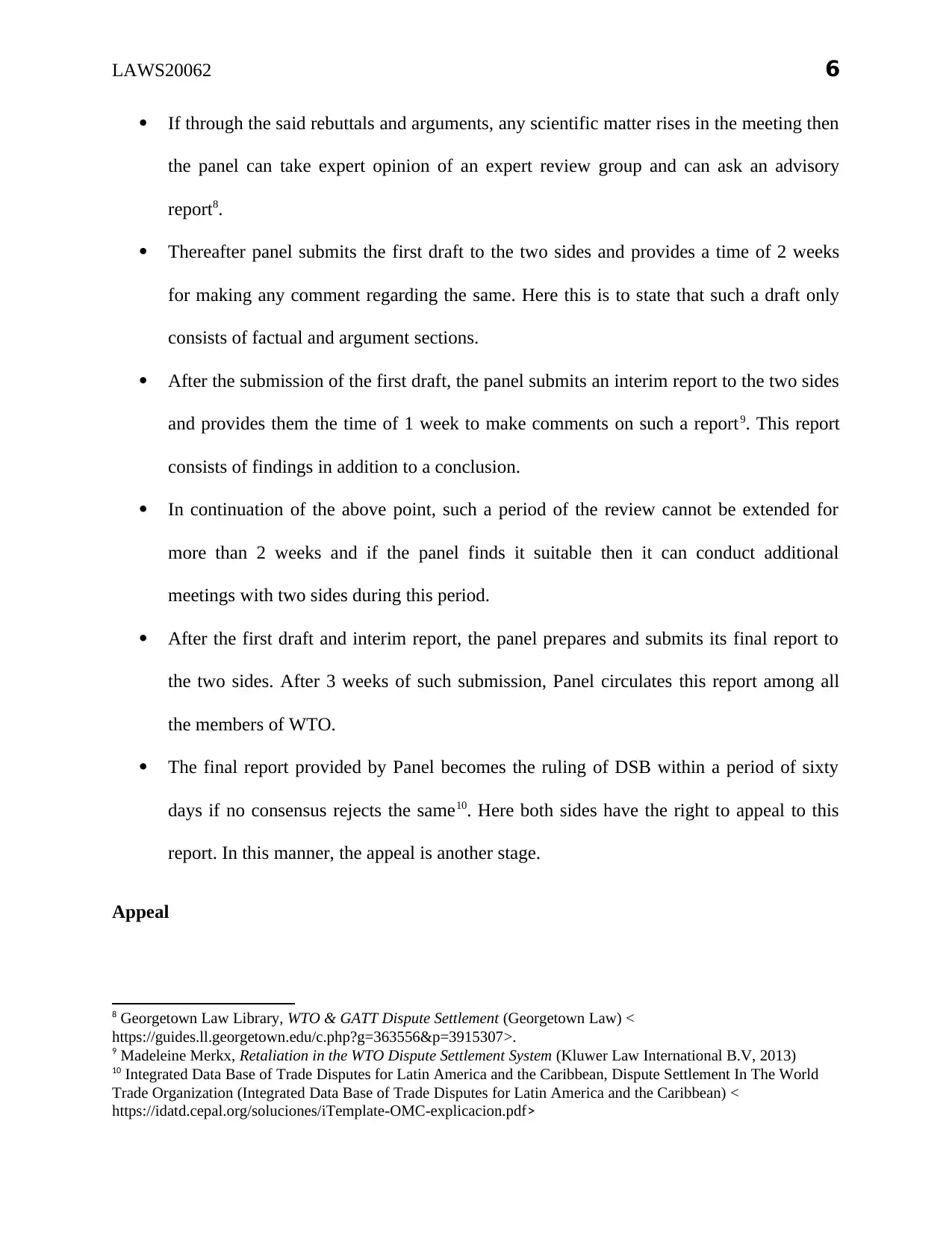
LAWS20062 6
If through the said rebuttals and arguments, any scientific matter rises in the meeting then
the panel can take expert opinion of an expert review group and can ask an advisory
report8.
Thereafter panel submits the first draft to the two sides and provides a time of 2 weeks
for making any comment regarding the same. Here this is to state that such a draft only
consists of factual and argument sections.
After the submission of the first draft, the panel submits an interim report to the two sides
and provides them the time of 1 week to make comments on such a report9. This report
consists of findings in addition to a conclusion.
In continuation of the above point, such a period of the review cannot be extended for
more than 2 weeks and if the panel finds it suitable then it can conduct additional
meetings with two sides during this period.
After the first draft and interim report, the panel prepares and submits its final report to
the two sides. After 3 weeks of such submission, Panel circulates this report among all
the members of WTO.
The final report provided by Panel becomes the ruling of DSB within a period of sixty
days if no consensus rejects the same10. Here both sides have the right to appeal to this
report. In this manner, the appeal is another stage.
Appeal
8 Georgetown Law Library, WTO & GATT Dispute Settlement (Georgetown Law) <
https://guides.ll.georgetown.edu/c.php?g=363556&p=3915307>.
9 Madeleine Merkx, Retaliation in the WTO Dispute Settlement System (Kluwer Law International B.V, 2013)
10 Integrated Data Base of Trade Disputes for Latin America and the Caribbean, Dispute Settlement In The World
Trade Organization (Integrated Data Base of Trade Disputes for Latin America and the Caribbean) <
https://idatd.cepal.org/soluciones/iTemplate-OMC-explicacion.pdf>
If through the said rebuttals and arguments, any scientific matter rises in the meeting then
the panel can take expert opinion of an expert review group and can ask an advisory
report8.
Thereafter panel submits the first draft to the two sides and provides a time of 2 weeks
for making any comment regarding the same. Here this is to state that such a draft only
consists of factual and argument sections.
After the submission of the first draft, the panel submits an interim report to the two sides
and provides them the time of 1 week to make comments on such a report9. This report
consists of findings in addition to a conclusion.
In continuation of the above point, such a period of the review cannot be extended for
more than 2 weeks and if the panel finds it suitable then it can conduct additional
meetings with two sides during this period.
After the first draft and interim report, the panel prepares and submits its final report to
the two sides. After 3 weeks of such submission, Panel circulates this report among all
the members of WTO.
The final report provided by Panel becomes the ruling of DSB within a period of sixty
days if no consensus rejects the same10. Here both sides have the right to appeal to this
report. In this manner, the appeal is another stage.
Appeal
8 Georgetown Law Library, WTO & GATT Dispute Settlement (Georgetown Law) <
https://guides.ll.georgetown.edu/c.php?g=363556&p=3915307>.
9 Madeleine Merkx, Retaliation in the WTO Dispute Settlement System (Kluwer Law International B.V, 2013)
10 Integrated Data Base of Trade Disputes for Latin America and the Caribbean, Dispute Settlement In The World
Trade Organization (Integrated Data Base of Trade Disputes for Latin America and the Caribbean) <
https://idatd.cepal.org/soluciones/iTemplate-OMC-explicacion.pdf>
Paraphrase This Document
Need a fresh take? Get an instant paraphrase of this document with our AI Paraphraser
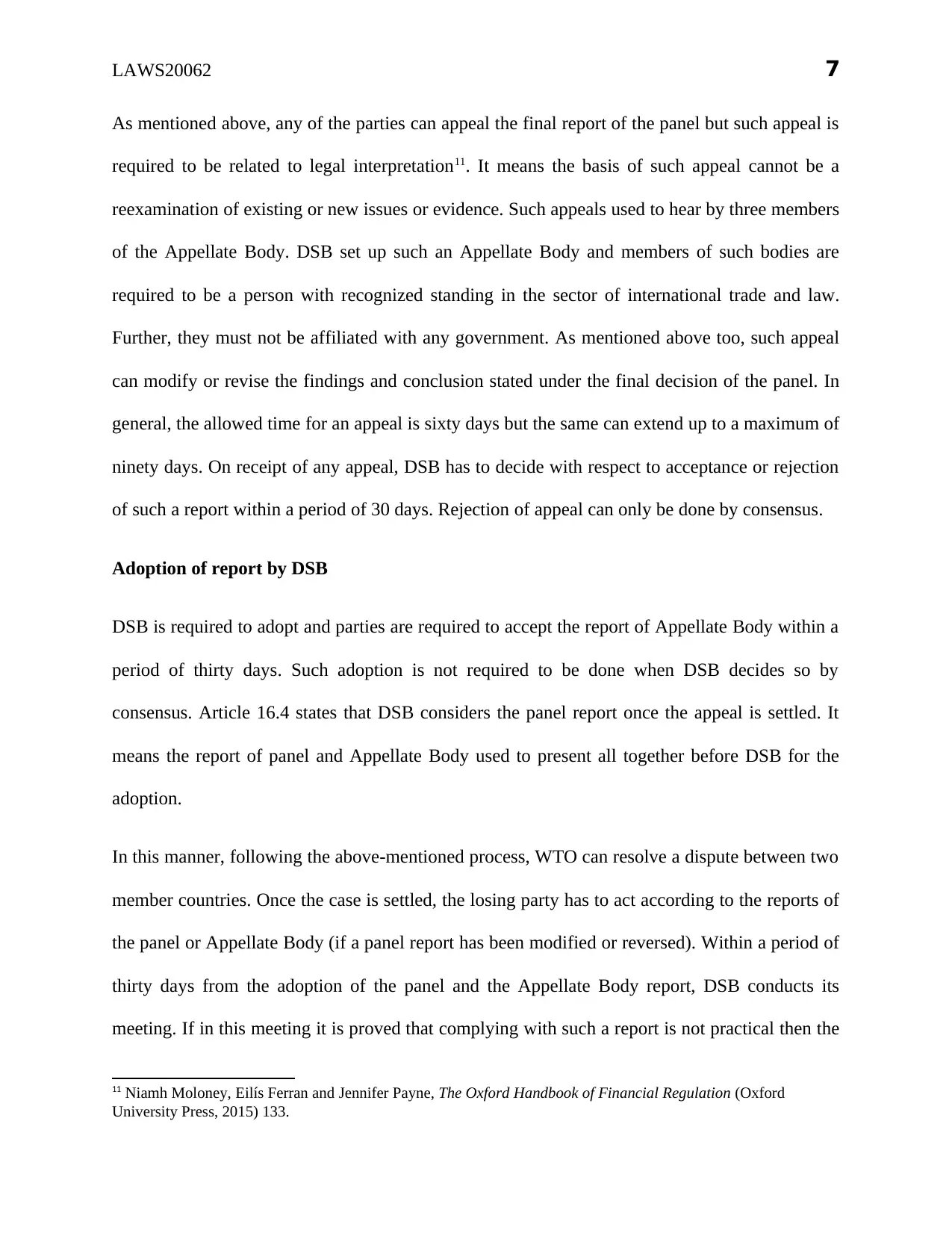
LAWS20062 7
As mentioned above, any of the parties can appeal the final report of the panel but such appeal is
required to be related to legal interpretation11. It means the basis of such appeal cannot be a
reexamination of existing or new issues or evidence. Such appeals used to hear by three members
of the Appellate Body. DSB set up such an Appellate Body and members of such bodies are
required to be a person with recognized standing in the sector of international trade and law.
Further, they must not be affiliated with any government. As mentioned above too, such appeal
can modify or revise the findings and conclusion stated under the final decision of the panel. In
general, the allowed time for an appeal is sixty days but the same can extend up to a maximum of
ninety days. On receipt of any appeal, DSB has to decide with respect to acceptance or rejection
of such a report within a period of 30 days. Rejection of appeal can only be done by consensus.
Adoption of report by DSB
DSB is required to adopt and parties are required to accept the report of Appellate Body within a
period of thirty days. Such adoption is not required to be done when DSB decides so by
consensus. Article 16.4 states that DSB considers the panel report once the appeal is settled. It
means the report of panel and Appellate Body used to present all together before DSB for the
adoption.
In this manner, following the above-mentioned process, WTO can resolve a dispute between two
member countries. Once the case is settled, the losing party has to act according to the reports of
the panel or Appellate Body (if a panel report has been modified or reversed). Within a period of
thirty days from the adoption of the panel and the Appellate Body report, DSB conducts its
meeting. If in this meeting it is proved that complying with such a report is not practical then the
11 Niamh Moloney, Eilís Ferran and Jennifer Payne, The Oxford Handbook of Financial Regulation (Oxford
University Press, 2015) 133.
As mentioned above, any of the parties can appeal the final report of the panel but such appeal is
required to be related to legal interpretation11. It means the basis of such appeal cannot be a
reexamination of existing or new issues or evidence. Such appeals used to hear by three members
of the Appellate Body. DSB set up such an Appellate Body and members of such bodies are
required to be a person with recognized standing in the sector of international trade and law.
Further, they must not be affiliated with any government. As mentioned above too, such appeal
can modify or revise the findings and conclusion stated under the final decision of the panel. In
general, the allowed time for an appeal is sixty days but the same can extend up to a maximum of
ninety days. On receipt of any appeal, DSB has to decide with respect to acceptance or rejection
of such a report within a period of 30 days. Rejection of appeal can only be done by consensus.
Adoption of report by DSB
DSB is required to adopt and parties are required to accept the report of Appellate Body within a
period of thirty days. Such adoption is not required to be done when DSB decides so by
consensus. Article 16.4 states that DSB considers the panel report once the appeal is settled. It
means the report of panel and Appellate Body used to present all together before DSB for the
adoption.
In this manner, following the above-mentioned process, WTO can resolve a dispute between two
member countries. Once the case is settled, the losing party has to act according to the reports of
the panel or Appellate Body (if a panel report has been modified or reversed). Within a period of
thirty days from the adoption of the panel and the Appellate Body report, DSB conducts its
meeting. If in this meeting it is proved that complying with such a report is not practical then the
11 Niamh Moloney, Eilís Ferran and Jennifer Payne, The Oxford Handbook of Financial Regulation (Oxford
University Press, 2015) 133.
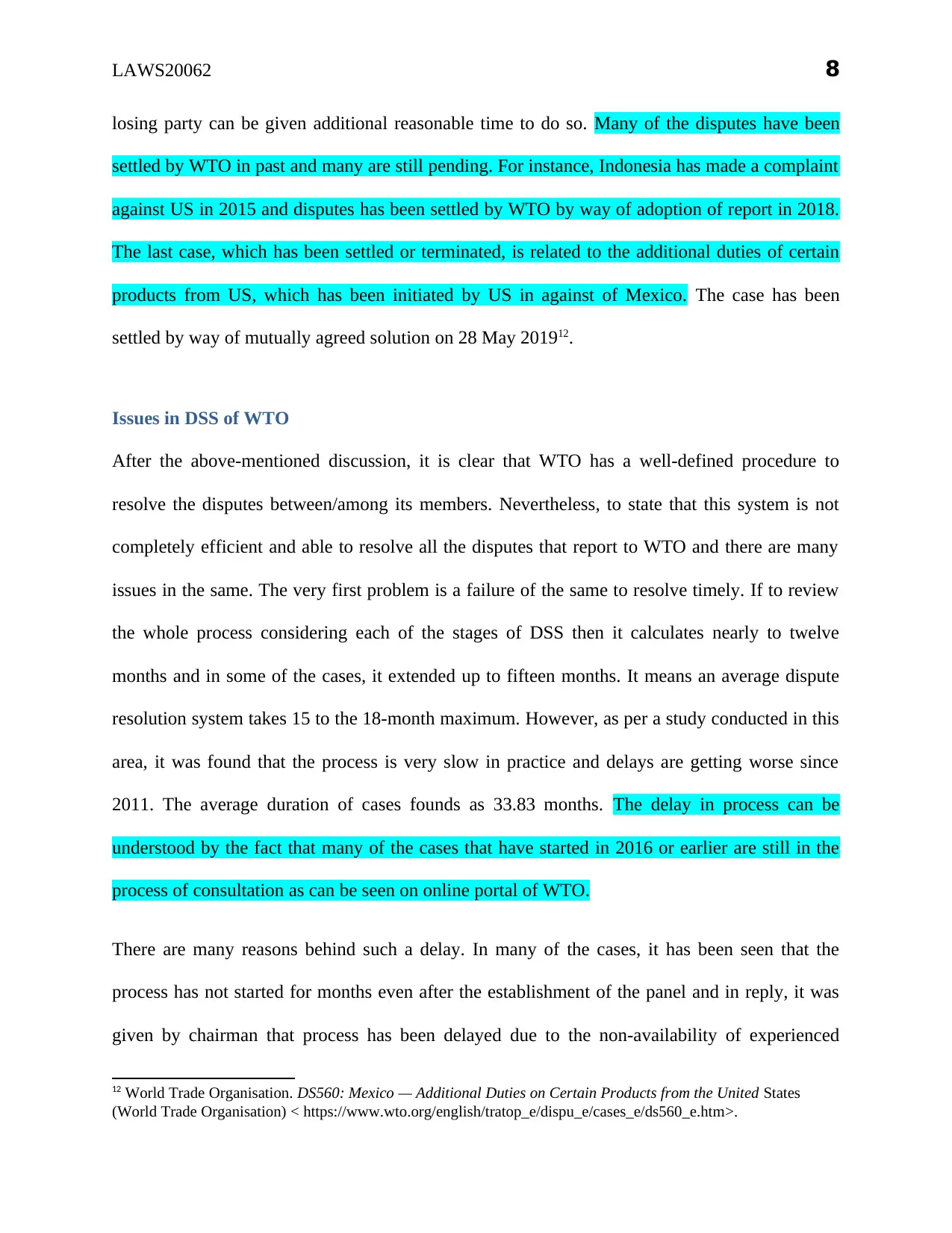
LAWS20062 8
losing party can be given additional reasonable time to do so. Many of the disputes have been
settled by WTO in past and many are still pending. For instance, Indonesia has made a complaint
against US in 2015 and disputes has been settled by WTO by way of adoption of report in 2018.
The last case, which has been settled or terminated, is related to the additional duties of certain
products from US, which has been initiated by US in against of Mexico. The case has been
settled by way of mutually agreed solution on 28 May 201912.
Issues in DSS of WTO
After the above-mentioned discussion, it is clear that WTO has a well-defined procedure to
resolve the disputes between/among its members. Nevertheless, to state that this system is not
completely efficient and able to resolve all the disputes that report to WTO and there are many
issues in the same. The very first problem is a failure of the same to resolve timely. If to review
the whole process considering each of the stages of DSS then it calculates nearly to twelve
months and in some of the cases, it extended up to fifteen months. It means an average dispute
resolution system takes 15 to the 18-month maximum. However, as per a study conducted in this
area, it was found that the process is very slow in practice and delays are getting worse since
2011. The average duration of cases founds as 33.83 months. The delay in process can be
understood by the fact that many of the cases that have started in 2016 or earlier are still in the
process of consultation as can be seen on online portal of WTO.
There are many reasons behind such a delay. In many of the cases, it has been seen that the
process has not started for months even after the establishment of the panel and in reply, it was
given by chairman that process has been delayed due to the non-availability of experienced
12 World Trade Organisation. DS560: Mexico — Additional Duties on Certain Products from the United States
(World Trade Organisation) < https://www.wto.org/english/tratop_e/dispu_e/cases_e/ds560_e.htm>.
losing party can be given additional reasonable time to do so. Many of the disputes have been
settled by WTO in past and many are still pending. For instance, Indonesia has made a complaint
against US in 2015 and disputes has been settled by WTO by way of adoption of report in 2018.
The last case, which has been settled or terminated, is related to the additional duties of certain
products from US, which has been initiated by US in against of Mexico. The case has been
settled by way of mutually agreed solution on 28 May 201912.
Issues in DSS of WTO
After the above-mentioned discussion, it is clear that WTO has a well-defined procedure to
resolve the disputes between/among its members. Nevertheless, to state that this system is not
completely efficient and able to resolve all the disputes that report to WTO and there are many
issues in the same. The very first problem is a failure of the same to resolve timely. If to review
the whole process considering each of the stages of DSS then it calculates nearly to twelve
months and in some of the cases, it extended up to fifteen months. It means an average dispute
resolution system takes 15 to the 18-month maximum. However, as per a study conducted in this
area, it was found that the process is very slow in practice and delays are getting worse since
2011. The average duration of cases founds as 33.83 months. The delay in process can be
understood by the fact that many of the cases that have started in 2016 or earlier are still in the
process of consultation as can be seen on online portal of WTO.
There are many reasons behind such a delay. In many of the cases, it has been seen that the
process has not started for months even after the establishment of the panel and in reply, it was
given by chairman that process has been delayed due to the non-availability of experienced
12 World Trade Organisation. DS560: Mexico — Additional Duties on Certain Products from the United States
(World Trade Organisation) < https://www.wto.org/english/tratop_e/dispu_e/cases_e/ds560_e.htm>.
⊘ This is a preview!⊘
Do you want full access?
Subscribe today to unlock all pages.

Trusted by 1+ million students worldwide
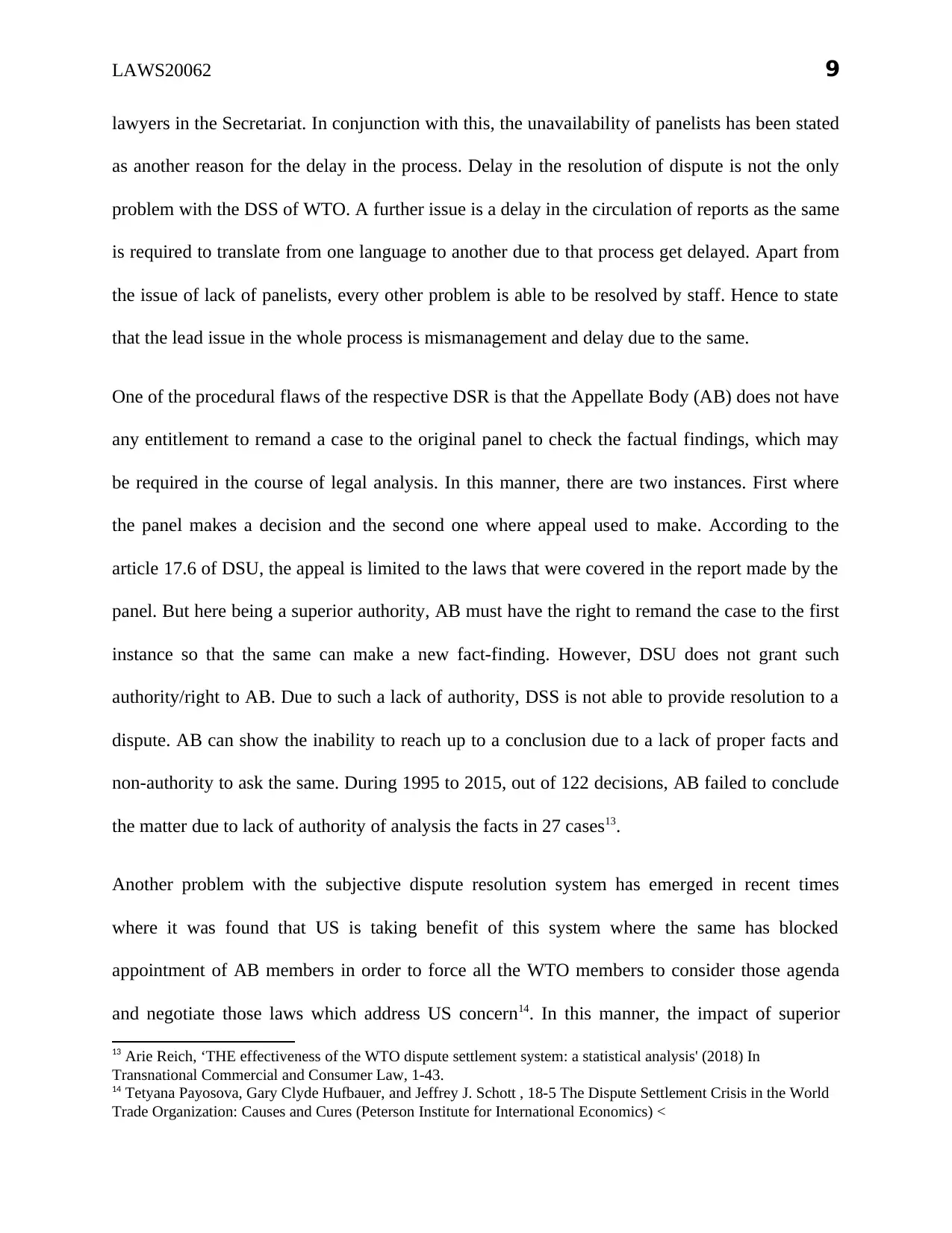
LAWS20062 9
lawyers in the Secretariat. In conjunction with this, the unavailability of panelists has been stated
as another reason for the delay in the process. Delay in the resolution of dispute is not the only
problem with the DSS of WTO. A further issue is a delay in the circulation of reports as the same
is required to translate from one language to another due to that process get delayed. Apart from
the issue of lack of panelists, every other problem is able to be resolved by staff. Hence to state
that the lead issue in the whole process is mismanagement and delay due to the same.
One of the procedural flaws of the respective DSR is that the Appellate Body (AB) does not have
any entitlement to remand a case to the original panel to check the factual findings, which may
be required in the course of legal analysis. In this manner, there are two instances. First where
the panel makes a decision and the second one where appeal used to make. According to the
article 17.6 of DSU, the appeal is limited to the laws that were covered in the report made by the
panel. But here being a superior authority, AB must have the right to remand the case to the first
instance so that the same can make a new fact-finding. However, DSU does not grant such
authority/right to AB. Due to such a lack of authority, DSS is not able to provide resolution to a
dispute. AB can show the inability to reach up to a conclusion due to a lack of proper facts and
non-authority to ask the same. During 1995 to 2015, out of 122 decisions, AB failed to conclude
the matter due to lack of authority of analysis the facts in 27 cases13.
Another problem with the subjective dispute resolution system has emerged in recent times
where it was found that US is taking benefit of this system where the same has blocked
appointment of AB members in order to force all the WTO members to consider those agenda
and negotiate those laws which address US concern14. In this manner, the impact of superior
13 Arie Reich, ‘THE effectiveness of the WTO dispute settlement system: a statistical analysis' (2018) In
Transnational Commercial and Consumer Law, 1-43.
14 Tetyana Payosova, Gary Clyde Hufbauer, and Jeffrey J. Schott , 18-5 The Dispute Settlement Crisis in the World
Trade Organization: Causes and Cures (Peterson Institute for International Economics) <
lawyers in the Secretariat. In conjunction with this, the unavailability of panelists has been stated
as another reason for the delay in the process. Delay in the resolution of dispute is not the only
problem with the DSS of WTO. A further issue is a delay in the circulation of reports as the same
is required to translate from one language to another due to that process get delayed. Apart from
the issue of lack of panelists, every other problem is able to be resolved by staff. Hence to state
that the lead issue in the whole process is mismanagement and delay due to the same.
One of the procedural flaws of the respective DSR is that the Appellate Body (AB) does not have
any entitlement to remand a case to the original panel to check the factual findings, which may
be required in the course of legal analysis. In this manner, there are two instances. First where
the panel makes a decision and the second one where appeal used to make. According to the
article 17.6 of DSU, the appeal is limited to the laws that were covered in the report made by the
panel. But here being a superior authority, AB must have the right to remand the case to the first
instance so that the same can make a new fact-finding. However, DSU does not grant such
authority/right to AB. Due to such a lack of authority, DSS is not able to provide resolution to a
dispute. AB can show the inability to reach up to a conclusion due to a lack of proper facts and
non-authority to ask the same. During 1995 to 2015, out of 122 decisions, AB failed to conclude
the matter due to lack of authority of analysis the facts in 27 cases13.
Another problem with the subjective dispute resolution system has emerged in recent times
where it was found that US is taking benefit of this system where the same has blocked
appointment of AB members in order to force all the WTO members to consider those agenda
and negotiate those laws which address US concern14. In this manner, the impact of superior
13 Arie Reich, ‘THE effectiveness of the WTO dispute settlement system: a statistical analysis' (2018) In
Transnational Commercial and Consumer Law, 1-43.
14 Tetyana Payosova, Gary Clyde Hufbauer, and Jeffrey J. Schott , 18-5 The Dispute Settlement Crisis in the World
Trade Organization: Causes and Cures (Peterson Institute for International Economics) <
Paraphrase This Document
Need a fresh take? Get an instant paraphrase of this document with our AI Paraphraser
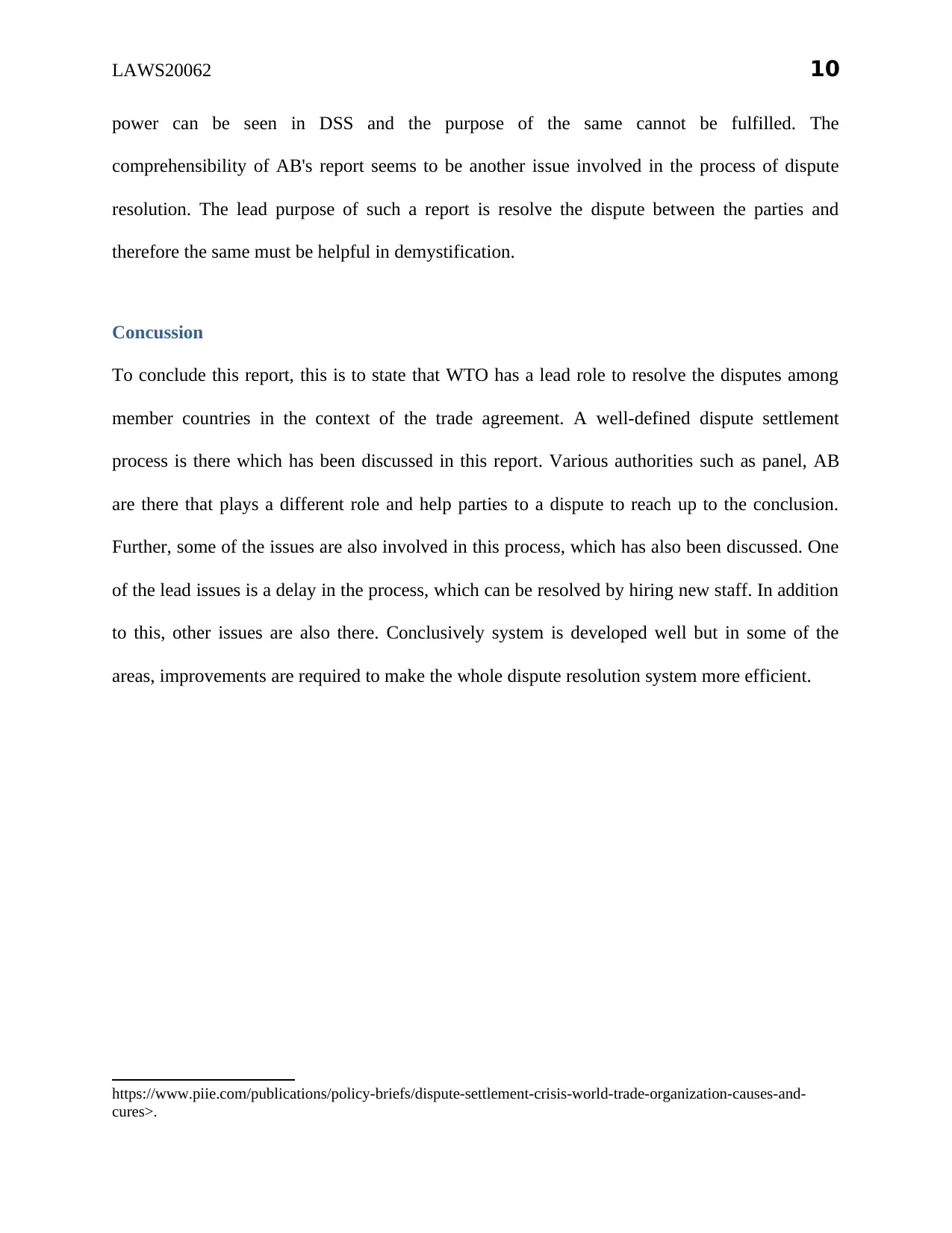
LAWS20062 10
power can be seen in DSS and the purpose of the same cannot be fulfilled. The
comprehensibility of AB's report seems to be another issue involved in the process of dispute
resolution. The lead purpose of such a report is resolve the dispute between the parties and
therefore the same must be helpful in demystification.
Concussion
To conclude this report, this is to state that WTO has a lead role to resolve the disputes among
member countries in the context of the trade agreement. A well-defined dispute settlement
process is there which has been discussed in this report. Various authorities such as panel, AB
are there that plays a different role and help parties to a dispute to reach up to the conclusion.
Further, some of the issues are also involved in this process, which has also been discussed. One
of the lead issues is a delay in the process, which can be resolved by hiring new staff. In addition
to this, other issues are also there. Conclusively system is developed well but in some of the
areas, improvements are required to make the whole dispute resolution system more efficient.
https://www.piie.com/publications/policy-briefs/dispute-settlement-crisis-world-trade-organization-causes-and-
cures>.
power can be seen in DSS and the purpose of the same cannot be fulfilled. The
comprehensibility of AB's report seems to be another issue involved in the process of dispute
resolution. The lead purpose of such a report is resolve the dispute between the parties and
therefore the same must be helpful in demystification.
Concussion
To conclude this report, this is to state that WTO has a lead role to resolve the disputes among
member countries in the context of the trade agreement. A well-defined dispute settlement
process is there which has been discussed in this report. Various authorities such as panel, AB
are there that plays a different role and help parties to a dispute to reach up to the conclusion.
Further, some of the issues are also involved in this process, which has also been discussed. One
of the lead issues is a delay in the process, which can be resolved by hiring new staff. In addition
to this, other issues are also there. Conclusively system is developed well but in some of the
areas, improvements are required to make the whole dispute resolution system more efficient.
https://www.piie.com/publications/policy-briefs/dispute-settlement-crisis-world-trade-organization-causes-and-
cures>.
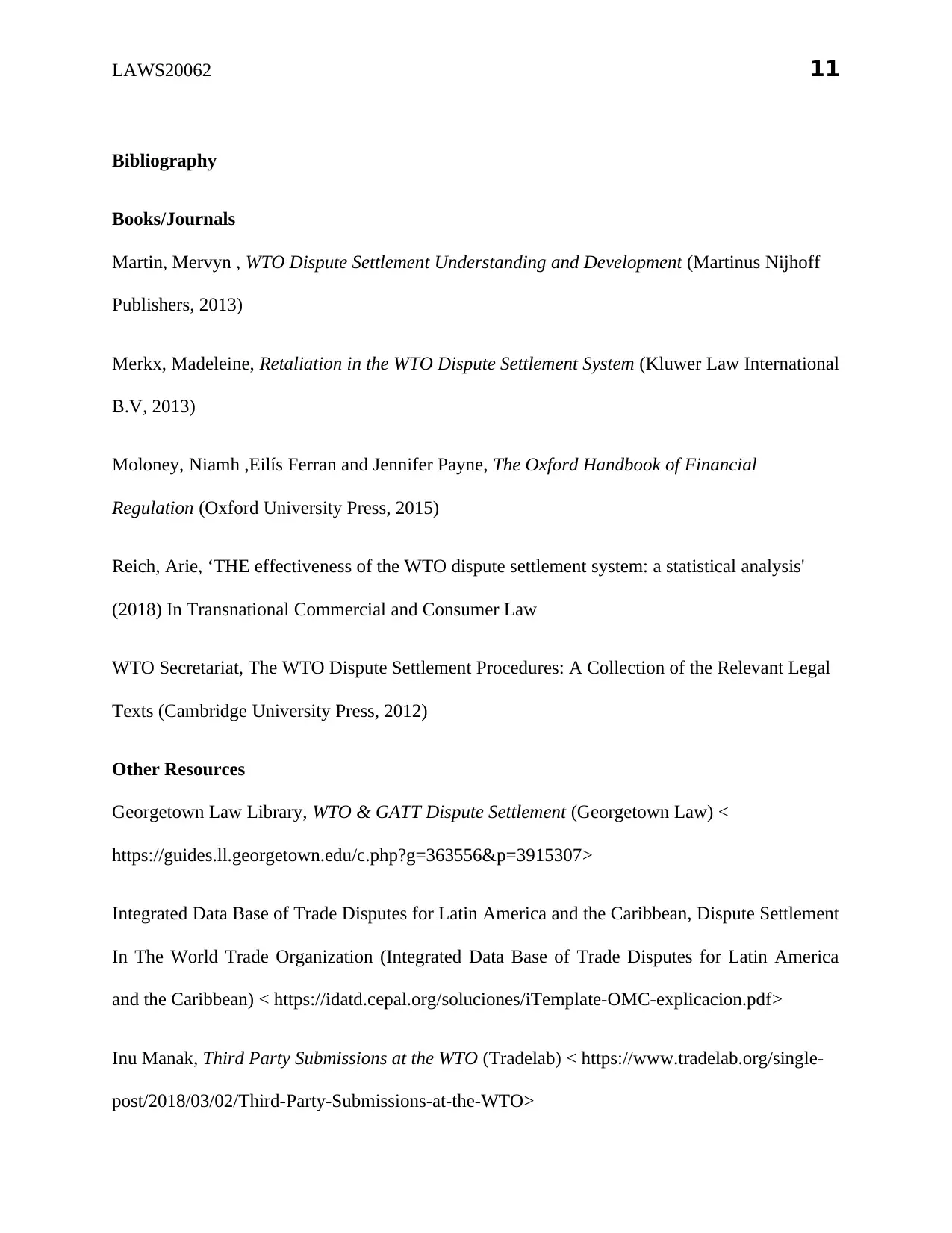
LAWS20062 11
Bibliography
Books/Journals
Martin, Mervyn , WTO Dispute Settlement Understanding and Development (Martinus Nijhoff
Publishers, 2013)
Merkx, Madeleine, Retaliation in the WTO Dispute Settlement System (Kluwer Law International
B.V, 2013)
Moloney, Niamh ,Eilís Ferran and Jennifer Payne, The Oxford Handbook of Financial
Regulation (Oxford University Press, 2015)
Reich, Arie, ‘THE effectiveness of the WTO dispute settlement system: a statistical analysis'
(2018) In Transnational Commercial and Consumer Law
WTO Secretariat, The WTO Dispute Settlement Procedures: A Collection of the Relevant Legal
Texts (Cambridge University Press, 2012)
Other Resources
Georgetown Law Library, WTO & GATT Dispute Settlement (Georgetown Law) <
https://guides.ll.georgetown.edu/c.php?g=363556&p=3915307>
Integrated Data Base of Trade Disputes for Latin America and the Caribbean, Dispute Settlement
In The World Trade Organization (Integrated Data Base of Trade Disputes for Latin America
and the Caribbean) < https://idatd.cepal.org/soluciones/iTemplate-OMC-explicacion.pdf>
Inu Manak, Third Party Submissions at the WTO (Tradelab) < https://www.tradelab.org/single-
post/2018/03/02/Third-Party-Submissions-at-the-WTO>
Bibliography
Books/Journals
Martin, Mervyn , WTO Dispute Settlement Understanding and Development (Martinus Nijhoff
Publishers, 2013)
Merkx, Madeleine, Retaliation in the WTO Dispute Settlement System (Kluwer Law International
B.V, 2013)
Moloney, Niamh ,Eilís Ferran and Jennifer Payne, The Oxford Handbook of Financial
Regulation (Oxford University Press, 2015)
Reich, Arie, ‘THE effectiveness of the WTO dispute settlement system: a statistical analysis'
(2018) In Transnational Commercial and Consumer Law
WTO Secretariat, The WTO Dispute Settlement Procedures: A Collection of the Relevant Legal
Texts (Cambridge University Press, 2012)
Other Resources
Georgetown Law Library, WTO & GATT Dispute Settlement (Georgetown Law) <
https://guides.ll.georgetown.edu/c.php?g=363556&p=3915307>
Integrated Data Base of Trade Disputes for Latin America and the Caribbean, Dispute Settlement
In The World Trade Organization (Integrated Data Base of Trade Disputes for Latin America
and the Caribbean) < https://idatd.cepal.org/soluciones/iTemplate-OMC-explicacion.pdf>
Inu Manak, Third Party Submissions at the WTO (Tradelab) < https://www.tradelab.org/single-
post/2018/03/02/Third-Party-Submissions-at-the-WTO>
⊘ This is a preview!⊘
Do you want full access?
Subscribe today to unlock all pages.

Trusted by 1+ million students worldwide
1 out of 13
Related Documents
Your All-in-One AI-Powered Toolkit for Academic Success.
+13062052269
info@desklib.com
Available 24*7 on WhatsApp / Email
![[object Object]](/_next/static/media/star-bottom.7253800d.svg)
Unlock your academic potential
Copyright © 2020–2026 A2Z Services. All Rights Reserved. Developed and managed by ZUCOL.





